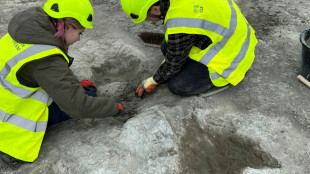
-
 Vikings-Lions showdown to end season will decide NFC top seed
Vikings-Lions showdown to end season will decide NFC top seed
-
Vegas Tesla blast suspect's motive unknown as death ruled suicide

-
 Allen and Goff to start NFL Pro Bowl Games as Mahomes snubbed
Allen and Goff to start NFL Pro Bowl Games as Mahomes snubbed
-
Apple agrees to $95 mn deal to settle Siri eavesdropping suit

-
 South Korea investigators attempt to arrest President Yoon
South Korea investigators attempt to arrest President Yoon
-
Tears, tourism on Bourbon Street after US terror nightmare

-
 Extradited SKorean crypto 'genius' in court to face US charges
Extradited SKorean crypto 'genius' in court to face US charges
-
Venezuela offers $100,000 reward for exiled opposition candidate

-
 South Korea investigators arrive to attempt to arrest president
South Korea investigators arrive to attempt to arrest president
-
Giannis and Jokic lead NBA All-Star voting with LeBron well back

-
 Mixed day for global stocks as dollar pushes higher
Mixed day for global stocks as dollar pushes higher
-
Nick Clegg leaves Meta global policy team

-
 Vegas Tesla blast suspect shot himself in head: officials
Vegas Tesla blast suspect shot himself in head: officials
-
Shiffrin hopes to be back on slopes 'in the next week'

-
 Dumfries double takes Inter into Italian Super Cup final
Dumfries double takes Inter into Italian Super Cup final
-
Spain's Canary Islands received record 46,843 migrants in 2024: ministry

-
 Panama says migrant jungle crossings fell 41% in 2024
Panama says migrant jungle crossings fell 41% in 2024
-
UN experts slam Israel's 'blatant assault' on health rights in Gaza

-
 Tesla reports lower 2024 auto deliveries, missing forecast
Tesla reports lower 2024 auto deliveries, missing forecast
-
Meghan Markle's lifestyle show to premiere Jan 15 on Netflix

-
 On Bourbon Street, a grim cleanup after deadly nightmare
On Bourbon Street, a grim cleanup after deadly nightmare
-
New Orleans attacker: US Army vet 'inspired' by Islamic State

-
 New Orleans killer acted alone, professed loyalty to jihadist group: FBI
New Orleans killer acted alone, professed loyalty to jihadist group: FBI
-
Wall Street lifts spirits after Asia starts year in red

-
 UK's biggest dinosaur footprint site uncovered
UK's biggest dinosaur footprint site uncovered
-
Former Australia coach Langer to take charge of London Spirit

-
 Most UK doctors suffer from 'compassion fatigue': poll
Most UK doctors suffer from 'compassion fatigue': poll
-
Everton boss Dyche unconcerned by Maupay jibe

-
 FBI probes potential accomplices in New Orleans truck ramming
FBI probes potential accomplices in New Orleans truck ramming
-
Secret lab developing UK's first quantum clock: defence ministry

-
 Premier League chief fears Club World Cup's impact on Man City and Chelsea
Premier League chief fears Club World Cup's impact on Man City and Chelsea
-
US mulls new restrictions on Chinese drones

-
 Wall Street dons early green after Asia starts year in red
Wall Street dons early green after Asia starts year in red
-
Rosita Missoni of Italy's eponymous fashion house dies age 93

-
 27 sub-Saharan African migrants die off Tunisia in shipwrecks
27 sub-Saharan African migrants die off Tunisia in shipwrecks
-
UK grime star Stormzy banned from driving for nine months

-
 Neil Young dumps Glastonbury alleging 'BBC control'
Neil Young dumps Glastonbury alleging 'BBC control'
-
Djokovic, Sabalenka into Brisbane quarters as rising stars impress

-
 Swiatek battles back to take Poland into United Cup semis
Swiatek battles back to take Poland into United Cup semis
-
Electric cars took 89% of Norway market in 2024

-
 Stock markets begin new year with losses
Stock markets begin new year with losses
-
Rival South Korea camps face off as president holds out

-
 French downhill ace Sarrazin out of intensive care
French downhill ace Sarrazin out of intensive care
-
Djokovic cruises past Monfils as rising stars impress in Brisbane

-
 Montenegro mourns after gunman kills 12
Montenegro mourns after gunman kills 12
-
Sales surge in 2024 for Chinese EV giant BYD

-
 Agnes Keleti, world's oldest Olympic champion, dies at 103
Agnes Keleti, world's oldest Olympic champion, dies at 103
-
Asian stocks begin year on cautious note

-
 Andreeva, Mpetshi Perricard showcase Australian Open potential
Andreeva, Mpetshi Perricard showcase Australian Open potential
-
South Korea police raid Jeju Air, airport over fatal crash


In Spain, abortions legal but barriers remain
When Spanish doctor Marta Vigara was 17 weeks pregnant, her waters broke and she quickly realised the prognosis for her pregnancy was "very bad".
A geriatric specialist working at Madrid's Clinico San Carlos hospital, she immediately went to her colleagues in the gynaecology department to have a therapeutic abortion.
Such a procedure can be carried out when a woman's life is in danger or the foetus has a severe abnormality.
But no doctor would do it on grounds there was still "a foetal heartbeat", directing her to a private clinic instead.
"I arrived at the clinic bleeding, probably because of a detached placenta," the 37-year-old told AFP at her Madrid apartment where she recounted the ordeal she lived through in December 2020.
Vigara later learnt that the entire gynaecology unit at Clinico San Carlos had declared themselves "conscientious objectors" against abortion.
Her experience illustrates how women in Spain still face obstacles when choosing to terminate a pregnancy even though abortion was decriminalised in 1985.
It's a situation Prime Minister Pedro Sanchez's leftist government wants to change.
There are no official statistics on how many doctors object to abortion in Spain.
But according to the OMC Spanish doctors' association, "most" obstetrician-gynaecologists who work in the public sector are "conscientious objectors", a term coined by pacifists who refuse military service.
That explains why 84.5 percent of abortions carried out in 2020 -- the last available official figures -- were done privately, with the state footing the bill.
In some regions, women travel hundreds of kilometres for an abortion because there is no private clinic nearby and the local hospital will not perform the procedure.
In eight of Spain's 50 provinces, no abortion has been carried out since the procedure was decriminalised in 1985, the government says.
It is preparing a law to guarantee access to the procedure at public hospitals, with the issue set to be a central theme at Spain's International Women's Day marches on Tuesday.
- Anti-abortion 'ambulance' -
Even when women can reach a private clinic, they are sometimes confronted by anti-abortion activists en route who pepper them with uncomfortable questions or prayers.
For the past decade, psychiatrist Jesus Poveda has gathered regularly with his team of "rescuers" outside the Dator private abortion clinic in Madrid to try and persuade women not to end their pregnancies.
They invite women to enter a van equipped with an ultrasound machine which they call an "ambulance" to show them that what they're carrying "is a living being", says Poveda, who teaches at Madrid's Autonomous University.
A draft law that passed its first reading in Spain's parliament in February will ban such protests outside abortion clinics as "harassment".
"We will keep coming," says Poveda, who has vowed to "get around the law" if it gets final approval, as expected.
The Catholic Association of Propagandists (ACdP) launched an ad campaign against the bill in January with posters in 33 cities reading: "Praying in front of abortion clinics is great."
- Dropping parental consent -
Sanchez's government also wants to modify the law so minors of 16 and 17 can terminate a pregnancy without their parents' consent, as is the case in Britain and France.
These youngsters can decide for themselves whether to "undergo a life or death operation, yet parental consent is required to voluntarily terminate a pregnancy," Equality Minister Irene Montero said last month.
Staunchly Catholic Spain decriminalised abortion in 1985 in cases of rape, if a foetus is malformed or if a birth poses a serious physical or psychological risk to the mother.
The scope of the law was broadened in 2010 by the previous socialist government to allow abortion on demand in the first 14 weeks of pregnancy.
But in 2015, a conservative Popular Party government tried to roll back the changes but had to back down in the face of strong public opposition.
Instead, it introduced the parental consent requirement for minors which exists in most European nations.
Vigara is hoping "things will change".
"When they send you away (to a private clinic), you feel a bit stigmatised as if you're doing something wrong. I felt very guilty and very miserable."
P.Anderson--BTB
